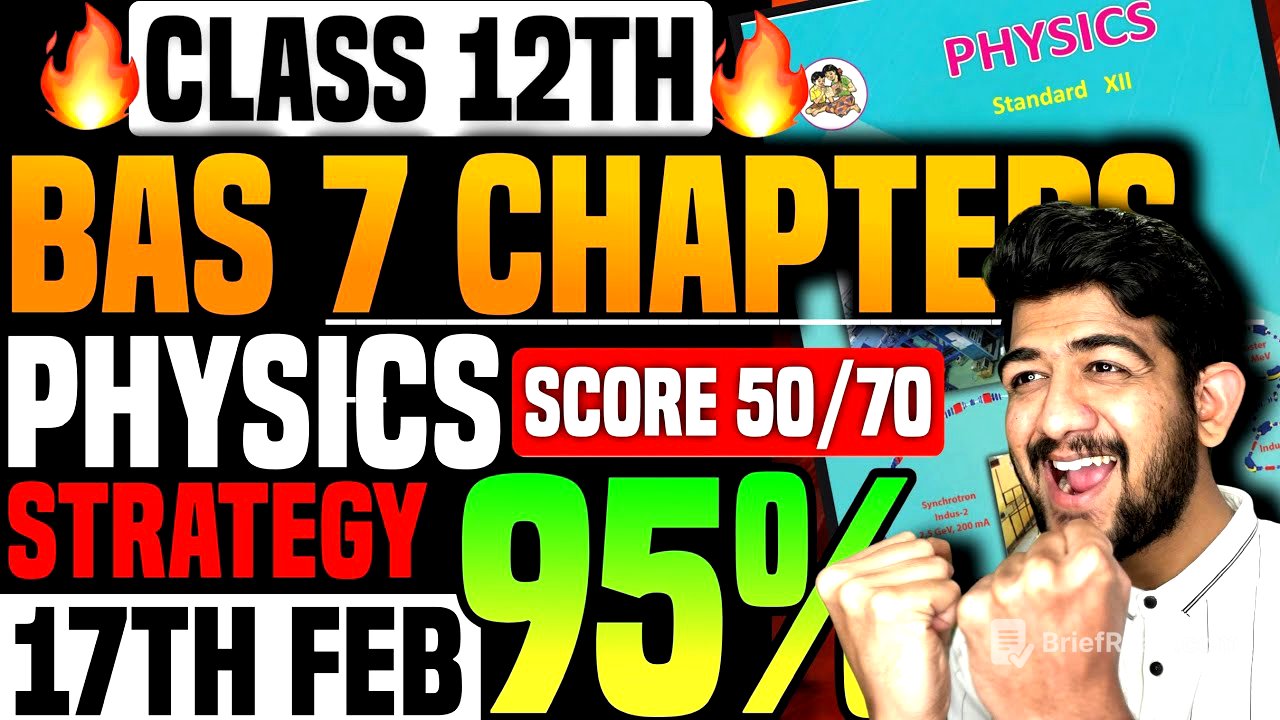TLDR;
This video provides guidance for students preparing for their physics board exams. It highlights common mistakes students make, particularly relying too much on live sessions without sufficient self-study. The video recommends focusing on seven key chapters to score at least 50 marks out of 70, and emphasises the importance of concept clarity, exercise completion, PYQ solving and sample paper practice. Additionally, it introduces the Vidya Alankar Score Booster book for CET preparation, offering solved papers, chapter-wise questions, formula summaries and mock tests.
- Focus on self-study rather than relying solely on live sessions.
- Master seven key chapters to secure a good score.
- Use concept understanding, exercise completion, PYQ solving and sample papers for effective preparation.
Introduction [0:00]
The video introduces a discussion about common mistakes students make while preparing for physics board exams. It promises to provide a point-by-point analysis of these errors and suggests a strategy to score well by focusing on specific chapters. The presenter aims to guide students on how to effectively prepare in the limited time available.
The Pitfalls of Over-Reliance on Live Sessions [0:48]
The presenter addresses the issue of students depending too heavily on live sessions and marathons without engaging in adequate self-study. While live sessions may provide temporary understanding, students often struggle to recall the concepts during exams due to a lack of personal study and practice. The presenter stresses the importance of self-study, including writing out derivations, solving numerical problems and learning definitions.
Effective Study Strategy [2:55]
The video outlines a three-step strategy for mastering the selected chapters. First, students should ensure they understand the concepts, using one-shot videos if necessary. Second, they should solve the exercises in the textbook. Third, they should tackle previous year's questions (PYQs) to understand the types of questions asked in board exams. The presenter also recommends using sample papers to assess preparation levels.
Reality Check: Importance of CET and Recommended Resource [4:31]
The presenter shifts the focus to the importance of the Maharashtra Common Entrance Test (CET) for securing admissions into government engineering and pharmacy colleges. He introduces the Vidya Alankar Score Booster book, which includes chapter-wise questions and solutions, formula summaries, shortcut methods from top scorers and updated content reflecting the CET 2025 syllabus. The book also covers new topics and includes solved papers from 2021 to 2024. Purchasing the book provides access to five full-syllabus mock tests with detailed analysis.
Key Chapters for Board Exams [8:10]
The video lists seven key chapters that can help students score well in the board exams: Rotational Dynamics, Mechanical Properties of Fluids, Kinetic Theory of Gases (KTG), Thermodynamics, Waves, Optics, Electromagnetics Induction and Electrostatics. By focusing on these chapters, students can potentially secure 40-50 marks out of 70. The presenter advises against striving for perfection and suggests following the 80/20 rule, focusing on achieving a decent score.
Recap of Study Method and Final Advice [9:17]
The presenter reiterates the study method: understand concepts, solve exercises, analyse PYQs and attempt sample papers. He emphasises that focusing on the seven key chapters and following this method will enable students to score between 40 and 50 marks. The presenter encourages students to solve question answers, exercises and sample papers. He advises against solely relying on live sessions and encourages self-study, including writing out derivations multiple times.









